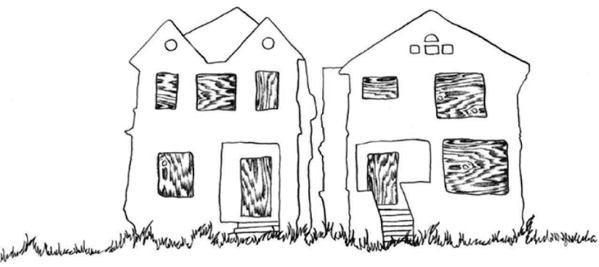Hannah Dobbz, a writer, filmmaker and activist, has been living in squats on and off for years. She's based in Pittsburgh, where there are plenty of empty buildings and just as many people ready to fill them. She looks at the housing crisis and sees a solution so utterly logical it kinda hurts: Put the homeless people in the empty houses. But of course that isn't the kind of world we live in. So Hannah and her cohorts have taken it upon themselves to change things, by educating people and opening a dialogue about housing. Hannah's currently raising money for a book to examine squatting and the history of housing rights in America. She's got a publisher, and is looking for research funding. If you think it's an issue that bears examination, you've got a few days to fund her Kickstarter. For more, read on.
Do you pay rent now? Right now I am living in a cooperatively owned house. We own it outright, so money only goes into bills, repairs, and property tax.
How did you become a squatting activist? In 2004, my friend Steve DeCaprio—who appears in the film— was having trouble with the police visiting his squat, so he asked if I could help him by videotaping the encounters so he could use the footage in court. After doing this a few times, Steve suggested that I make a documentary of it. So I expanded my filming to also include Hellarity House (an older squat in Oakland), and when I found myself in need of a place to live in 2005, I opened my own squat and filmed my experience there, too.
Tell us about one of the best squatting situations you've encountered, and one of the worst. In 2003, I spent a month at what later became known as the Magpie Squat in Dublin, Ireland. It was an old Georgian townhouse on Leeson Street with four stories plus basement and roof access. Ten people officially lived there, and they did so with a sense of intention: All the house members participated in house work days and group dinners. The arrangement was wonderfully organized, as they had had meetings together for months before even locating a potential building—which allowed them to have good internal dynamics and a good sense of their collective mission from the start. The worst squat? I have a feeling that some of the worst squats out there are ones that I would avoid being at in the first place. So I've probably never seen the worst squats. But I will admit that in 2004 a group of friends and I briefly attempted to squat a burned out house in Oakland with no roof—or walls, or floors in some places. That was a pretty stupid idea.
Are some squatters' rights the same no matter where in America you are? If so, what are the universal squatters' rights? "Squatters' rights" is a loaded term that carries a lot of implications but no real meaning. "Squatters' rights" exists on much of the same plane as does "human rights"; it's something we all hope for, but in the end, the police or the courts make the final decision. There is no law written in the United States called "squatters' rights." There are a few pieces of civil legislation that make squatting easier or harder, depending, but police will almost always overlook the law and treat the situation as a criminal matter. That said, if you can avoid police interference, and if you can make it in front of a judge to argue your case, there is a small possibility that you could argue some degree of tenants' rights, which may at least pad your eviction process with more time. You might also argue adverse possession (the specific rules of which vary state by state), but the chances of a judge approving of your claim is a longshot. Your best chance of living in a long-term squat is to just have amicable relationships with the neighbors and a landlord that is long dead.
What do you say to people who are fearful or hateful toward squatters? I try to discuss it like it's the most normal thing in the world. Someone who is already having trouble accepting the lifestyle, tactics, or political stance of squatters is not going to be swayed by an explanation about how it's just plain better than renting—and especially not by a treatise on how romantic is it. I think it also helps to explain the historical precedent of squatting, which works to disprove that it's just a juvenile and petulant cry of rebellion. It also helps to be realistic and concede that squatting is not always the best answer to a situation. Unfortunately, there is no centralized resource for American squatters. England has their Advisory Service for Squatters, but we have little more than a few entries on various squatting wikis (most of the legal information, I think, was contributed by Steve DeCaprio). I actually hope to provide a more complete, centralized resource for squatters with the book I'm writing for AK Press. I'm currently researching and writing about how historical land struggles and housing justice movements in the United States have shaped property law today, and how contemporary property law dictates the processes and the outcomes of modern American property struggles. I am raising money for this project's completion on Kickstarter.
For more Love and Trash DIY goodness, check these out:
- Possum Living By Dolly Freed
- Sandwich of the Week: Portobella Mushroom Ciabatta
- 6 Quick Planting Tips
A version of this post first appeared on Love and Trash.










